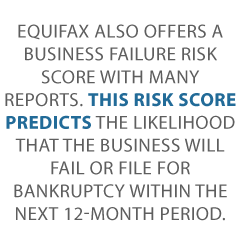- Connect With Us!
- (877) 600-2487
- info@creditsuite.com
A Few of Equifax’s Business Credit Scores
Published By Credit Suite at February 10th, 2016
What Are Equifax’s Business Credit Scores?
Take a look at Equifax’s business credit scores.
The Credit Risk Score
Equifax’s main business credit scoring model is the Credit Risk Score.
This score was created to predict the probability of a business customer becoming seriously delinquent on supplier accounts, or bankrupt. So this is within a 12-month period.
Credit scores range from 1 to 100, with a lower score indicating a higher risk of serious delinquency.
By definition the score predicts the likelihood of a business incurring a 90-days severe delinquency or charge-off. So this is over the next 12 months.
Scores of 90 and above express that obligations will come in as agreed. While scores from 80 to 89 indicate payments will come in 1 to 30 days overdue.
Scores of 60 to 79 represent payments being paid 31 to 60 days past the agreed-upon due date. While credit scores between 40 to 59 indicate payments come in 61 to 90 days overdue.
Scores between 20 to 39 mean obligations will come in 91 to 120 days overdue. While scores between 1 to 19 mean obligations will come in 120+ days past the due date.
Equifax’s Business Credit Scores: the Small Business Credit Risk Score
Equifax also provides a business credit score for suppliers they call the Small Business Credit Risk Score for Suppliers.
The design of this model is to help credit grantors improve their risk assessment. And it is to reduce delinquency rates while helping to improve profitability.
The score uses unique bank loans, lease information, credit card data, and supplier, Telco and utility credit history. And they use public records and firmographic data from their own Equifax Commercial database.
Equifax’s Small Business Credit Risk Score for Suppliers
The Small Business Credit Risk Score for Suppliers has credit scores that range from 101 to 816. Equifax also provides a business credit score for suppliers. They call it the Small Business Credit Risk Score for Suppliers.
The design of this model to help credit grantors improve their risk assessment. And it can help reduce delinquency rates while helping to improve profitability.
The score uses unique bank loans, lease information, credit card data, and supplier, Telco and utility credit history. So it also uses public records and firmographic data from their own Equifax Commercial database.
The Small Business Credit Risk Score for Suppliers credit scores range from 101 to 816.
Business Failure Risk Score
Equifax also offers a Business Failure Risk Score with many reports. This Risk Score predicts the likelihood that the business will fail or file for bankruptcy within the next 12-month period
This model helps identify businesses that pose a greater risk for failure. So in this way, suppliers and credit grantors can take appropriate actions.
Equifax’s Business Credit Scores, On Balance
These are the main business credit scores you will often see from Equifax. And now you know how they work and what they represent.
2020 Update
On February 10, 2020, the Boston Globe reported that Attorney General William Barr and the United States Justice Department were charging four members of China’s military on suspicion of the 2017 hack into Equifax. The Attorney General noted there have been any number of data theft by the Chinese military in recent years. These thefts have been of sensitive information such as identifying American intelligence officers. One use of Equifax‘s financial data could be to find out if any intelligence officers have money issues – and would thereby be subject to bribery or blackmail. Stay tuned as we continue to follow this story.

 " class="attachment-blog-single size-blog-single wp-post-image" alt="Get Business Credit Cards for New Businesses Credit Suite-Business Line of Credit Decoded" title="Get Business Credit Cards for New Businesses">>
" class="attachment-blog-single size-blog-single wp-post-image" alt="Get Business Credit Cards for New Businesses Credit Suite-Business Line of Credit Decoded" title="Get Business Credit Cards for New Businesses">>